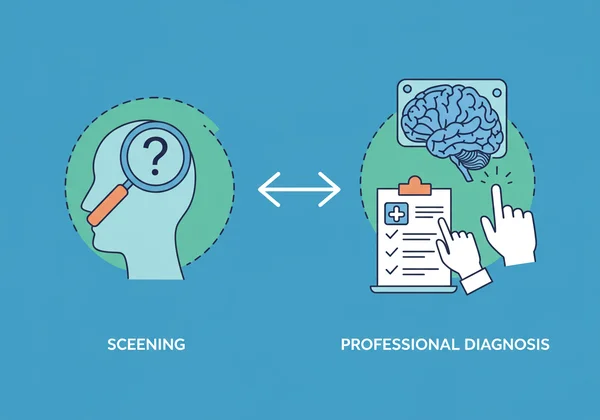After Your Online Bipolar Disorder Test: 7 Steps to Take Now
October 27, 2025 | By Leo Vance
Taking an online Bipolar Disorder Test is a significant and courageous first step toward understanding your mental health. You may be feeling a mix of relief, anxiety, or confusion right now, and that's completely normal. What do you do after getting your bipolar test results? This guide is here to walk you through a clear, compassionate, and actionable plan. Think of this as your roadmap from initial screening to gaining professional clarity, empowering you to navigate the next phase of your journey with confidence. The insights you've gained are valuable, and now it's time to use them effectively.
Taking a screening is a proactive move towards self-awareness. If you haven't yet, you can start your screening to gain initial insights into your mood patterns.
Acknowledge Your Feelings & Understand Bipolar Screening Results
The moments after you receive your results can feel overwhelming. Before you do anything else, take a deep breath. Acknowledge whatever emotions are coming up for you without judgment. Whether your results suggest a high or low likelihood of bipolar disorder, this is simply a piece of information—a starting point, not a final destination. Your feelings are valid, and this is a crucial time for self-compassion.
This initial step is about grounding yourself before moving forward. The goal of a screening tool is to illuminate patterns you may not have recognized, providing a new lens through which to view your experiences.
Processing What Your Online Bipolar Test Results Mean
It's vital to understand what an online screening tool, like the one offered at BipolarDisorderTest.org, is designed to do. It is not a diagnostic tool. Instead, it serves as an educational resource to help identify potential signs and symptoms that may be associated with bipolar disorder. Think of it as a preliminary flag, indicating that a deeper conversation with a healthcare professional is a wise next step.
Your results provide a snapshot based on the answers you gave. They can help you organize your thoughts and articulate your concerns more clearly when you do seek professional help. This self-awareness is a powerful asset in your mental health journey.
The Difference Between a Bipolar Screening & a Professional Diagnosis
This distinction is the most important concept to grasp. A screening questionnaire, based on established tools like the Mood Disorder Questionnaire (MDQ), identifies risk factors and patterns. A professional diagnosis, however, is a comprehensive clinical assessment performed by a qualified psychiatrist, psychologist, or medical doctor.
A formal diagnosis involves a detailed interview, a review of your personal and family medical history, and sometimes a physical exam to rule out other conditions. A screening is a single data point; a diagnosis is a full picture painted by an expert who can understand the nuances of your unique situation. The results from our free test can serve as an excellent starting point for that professional conversation.

Proactively Preparing for Your Bipolar Diagnosis Appointment
Now that you have your screening results, you can take proactive steps to prepare for a professional evaluation. This preparation will not only make your appointment more effective but can also help reduce the anxiety of waiting. You are moving from a place of uncertainty to one of empowered action.
Channel your energy into gathering information that will give your doctor the clearest possible understanding of your experiences. This is your opportunity to build a comprehensive case file of your own mental health.
Gathering Your Personal & Family Bipolar Mental Health History
A clinician will almost certainly ask about your mental health background and that of your family. Bipolar disorder often has a genetic component, so this information is highly relevant. Before your appointment, take some time to reflect on or jot down notes about:
- Your own history: When did you first notice mood swings? Have you ever been diagnosed with other conditions, like depression or anxiety? What treatments, if any, have you tried in the past?
- Family history: Do any of your relatives (parents, siblings, grandparents) have a diagnosed mental health condition? This includes bipolar disorder, depression, anxiety, or substance use disorders.
Starting a Mood Tracking Journal for Bipolar Pattern Insights
Mood tracking for bipolar symptoms is one of the most powerful tools at your disposal. Your screening results gave you a glimpse, but a daily journal provides the detailed evidence a doctor needs. For a few weeks leading up to your appointment, track the following:
- Your daily mood: Rate it on a scale of 1-10 (from very depressed to highly elevated/manic).
- Energy levels: Were you lethargic or bursting with energy?
- Sleep patterns: How many hours did you sleep? Did you feel rested?
- Significant behaviors: Note any impulsivity, racing thoughts, irritability, or periods of intense focus.
- Life events: Did anything specific happen that might have triggered a mood shift?
This journal provides objective data that goes beyond memory, helping to reveal the cyclical nature of potential bipolar symptoms.
![]()
Crafting Essential Questions to Ask Your Psychiatrist or Doctor
Walking into a doctor's office with a list of questions can transform the appointment from a passive experience into an active collaboration. It shows you are engaged in your own care and ensures you leave with the clarity you need. Preparing these questions can also help organize your own thoughts about what worries you most.
This preparation helps ensure that you don't forget anything important during the appointment. It’s your health, and you have the right to be a fully informed participant in every decision.
Key Inquiries About Bipolar Diagnosis, Symptoms & Treatment Options
Here are some essential questions to ask your psychiatrist to get the conversation started:
- Based on what I've shared, what is your professional opinion?
- What is the process for reaching a formal diagnosis? What other possibilities do we need to rule out?
- Could you explain the difference between Bipolar I, Bipolar II, and Cyclothymia?
- What are the typical treatment options, including therapy and medication?
- What are the potential side effects of any recommended medications?
- What lifestyle changes (e.g., sleep, exercise, routine) can support my treatment?
How to Discuss Your Online Bipolar Disorder Test Results Effectively
Don't be hesitant to bring up your screening results. You can say something like, "I've been concerned about my mood swings, so I took an online screening test for bipolar disorder. The results suggested I should speak with a professional, and it helped me organize some of my symptoms."
This frames the test correctly—as a tool that prompted you to seek expert advice. It shows you are being proactive, not self-diagnosing. Sharing the results from the BipolarDisorderTest.org test can provide a helpful summary of your concerns.

Building a Supportive Network While Seeking Bipolar Help
You do not have to go through this process alone. The time between screening and diagnosis can be isolating, but building a support system is a critical act of self-care. Reaching out can provide emotional stability and a practical sounding board as you take these next steps.
Whether you turn to friends, family, or organized groups, connection is a powerful antidote to anxiety and fear.
Connecting with Trusted Friends, Family & Understanding Loved Ones
Consider confiding in one or two people you trust implicitly—a partner, a close friend, or a family member. You don't need to share every detail, but simply saying, "I'm exploring some things about my mental health and could use some support right now," can make a world of difference.
Choose someone who is a good listener and non-judgmental. Their role is not to solve the problem but to offer a compassionate ear and remind you that you are not alone.
Exploring Online & Local Bipolar Support Groups
Connecting with people who have similar experiences can be incredibly validating. Hearing from others who have navigated the diagnostic process can demystify the experience and provide hope. Organizations like the National Alliance on Mental Illness (NAMI) or the Depression and Bipolar Support Alliance (DBSA) offer both online and local support groups where you can share and learn in a safe environment.

Your Proactive Path to Understanding & Managing Potential Bipolar Disorder
Taking an online bipolar screening was a brave and important decision. It has set you on a proactive path toward clarity and well-being. Remember, the goal isn't to walk away with a label, but to gain a deeper understanding of yourself so you can get the right support to live your best life. Use the steps outlined here to transform your screening results into empowered action.
Your journey is just beginning, and you've already taken the most difficult step—the first one. Continue to be your own best advocate, and trust that answers and support are available. If you are ready to take the first step, our confidential screening is here for you.
Frequently Asked Questions After Your Bipolar Screening
How do professionals test for bipolar disorder?
Professionals use a multi-faceted approach. There is no single test. A psychiatrist will conduct a thorough clinical interview about your symptoms, thoughts, and behaviors. They will assess your personal and family medical history, and they may use standardized diagnostic criteria from the DSM-5. The goal is to build a complete picture of your mood patterns over time.
Is there a blood test for bipolar disorder?
No, there is currently no blood test or brain scan that can diagnose bipolar disorder. While a doctor may order blood work, it is to rule out other medical conditions that can mimic bipolar symptoms, such as thyroid problems or vitamin deficiencies. The diagnosis remains a clinical assessment based on your reported experiences and a clinician's observations.
What is commonly mistaken for bipolar disorder during diagnosis?
Several conditions have overlapping symptoms. These include major depressive disorder (especially if hypomanic episodes are missed), attention-deficit/hyperactivity disorder (ADHD), borderline personality disorder (BPD), and anxiety disorders. This is why a comprehensive evaluation by a specialist is so crucial for an accurate diagnosis. Taking a free bipolar test can help gather information to differentiate these conditions.
What happens if suspected bipolar disorder is left untreated?
If left untreated, bipolar disorder can have a significant impact on a person's life, affecting relationships, career, and physical health. The mood episodes may become more frequent or severe over time. However, with an accurate diagnosis and a consistent treatment plan—often involving a combination of medication and therapy—most people with bipolar disorder lead full, productive, and satisfying lives.
Where can I get tested for bipolar disorder by a professional?
You can start by speaking with your primary care physician (PCP), who can provide a referral to a mental health specialist. The best professionals to see for a diagnosis are psychiatrists, who are medical doctors specializing in mental health and can prescribe medication. You can also seek out a licensed clinical psychologist for an evaluation and therapy.